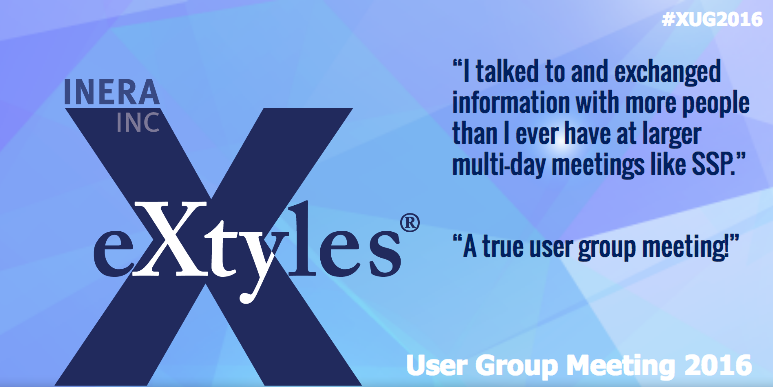
Last week, we hosted our twelfth annual eXtyles User Group Meeting, affectionately known as XUG. More than fifty eXtyles users—both old hands and greenhorns—gathered in the ballroom of the Sheraton Commander in Harvard Square to discuss eXtyles and publishing in the 21st century. This year, we departed from the usual agenda and brought a new focus to the discussions with a meeting theme: electronic publishing workflows.
Greater focus, wider lens
The biggest difference in the XUG agenda from previous years was themed breakout tables. During previous breakout sessions, attendees were divided into loose focus groups to brainstorm new features or improvements for eXtyles. The Inera Team would leave XUG with a very long list of ideas to digest and (hopefully) implement in the following 12 months.
This year, we did things differently. We assigned topics to each breakout table to encourage like-minded industry leaders to think outside the eXtyles box and discuss a variety of workflow topics, challenges, and solutions.
During the breakout session follow-up, Inerans and eXtyles users came back together as a group to discuss the major concerns and questions from each breakout table. Some of the themes we discussed were:
- Coordinating authors, copy-editors, and freelancers in an eXtyles workflow
- What is the correct amount of information about eXtyles to give to freelancers?
- Is there a way eXtyles can help clean up common errors introduced by freelancers?
- Managing your eXtyles configuration: best practices for eXtyles administrators
- How can we more easily keep administrator changes and Inera changes in sync?
- Can this be solved with a shared source control system? How would this work?
- Customer suggestions for new eXtyles features
- How can we more easily ensure that all of our users are using the most recent eXtyles update?
- Should eXtyles builds be released on a more fixed schedule?
- Author metadata: ORCID, CRedIT, and Funding Data
- Metadata are “sort of exploding.” How do we keep track of it all?
- How should we re-integrate metadata changes into published XML?
- How do we standardize our internal metadata?
- What workflow changes are you planning in the next year?
- There is a lot of resistance to workflow change. How can we mitigate these anxieties?
- What opportunities are there for education “around the edges” as we transition to new (eXtyles) workflows?
- Schematron rules for use on eXtyles XML files
- Where/when is the most useful point(s) to add validation?
- Can we use Schematron to validate XML generated by eXtyles? (yes!)
The big picture
This year, conversations were more focused on “big picture” issues rather than small changes in eXtyles functionality. We see this as a good change.
The eXtyles community spans very small and very large organizations that publish journals, books, standards, and reports in a variety of fields. Because eXtyles users are such a diverse community, not all eXtyles improvements under discussion apply to everyone. Expanding the conversation from specific, for example, “Author Processing” improvements, to more general, say, “contributor metadata” issues is more inclusive. More attendees can contribute to the conversation—and they did! As ideas are generated by a more diverse cross-section of the scholarly publishing community, we can find better solutions to complex problems and push electronic publishing forward together, as a community. After all, this is what XUG is all about.
Thank you!
We want to thank our guest speakers, Karie Kirkpatrick (American Physiological Society), Kim Breitfelder (IEEE), and Astrid DeRidder (Cambridge University Press) for sharing with us their experiences and insights on the changing landscape of publishing. We all gleaned a little wisdom from Karie and Kim’s similar experiences transitioning to an eXtyles workflow. Astrid reminded us that this is not the first time the publishing industry has changed, and we publishing professionals should take control of the way changing technologies shape our future.
We also want to thank you, dear eXtyles user, for continuing to make XUG our favorite two days of the year. If you missed XUG, most Inera and guest presentations are available in the XUG Archive.
We hope to see you all next year!